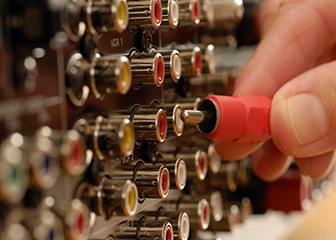Summary

| Quick Facts: Home Entertainment Equipment Installers and Repairers | |
|---|---|
|
$32,940 per year
$15.84 per hour |
|
| Postsecondary non-degree award | |
| None | |
| None | |
| 36,800 | |
| 14% (About as fast as average) | |
| 5,100 | |
What Home Entertainment Equipment Installers and Repairers Do
Home entertainment equipment installers and repairers set up and fix household audio and video equipment, such as televisions, stereo components, and home theater systems.
Work Environment
Although most home entertainment equipment installers and repairers work in electronics repair shops, many spend significant time traveling to customers’ homes. They generally work full time, and many work evenings or weekends, including overtime.
How to Become a Home Entertainment Equipment Installer or Repairer
Although employers prefer to hire applicants who have completed postsecondary training courses, many home entertainment equipment installers and repairers train informally on the job. Industry certification is becoming increasingly important.
Pay
The median annual wage of home entertainment equipment installers and repairers was $32,940 in May 2010.
Job Outlook
Employment of home entertainment equipment installers and repairers is expected to grow 14 percent from 2010 to 2020, as fast as the average for all occupations. Certified applicants with good customer service skills and a background in electronics repair should have the best job opportunities.
Similar Occupations
Compare the job duties, education, job growth, and pay of home entertainment equipment installers and repairers with similar occupations.
O*NET
O*NET provides comprehensive information on key characteristics of workers and occupations.
Contacts for More Information
Learn more about home entertainment equipment installers and repairers by contacting these additional resources.









